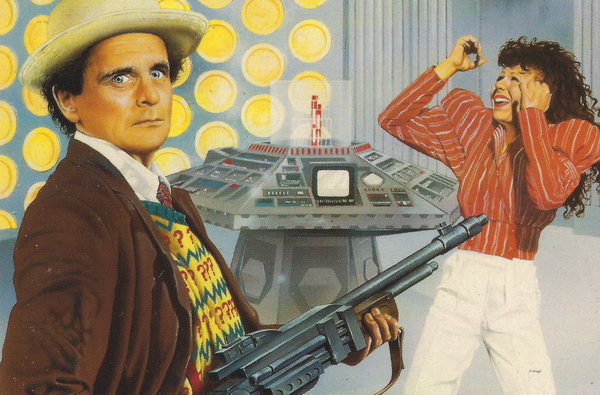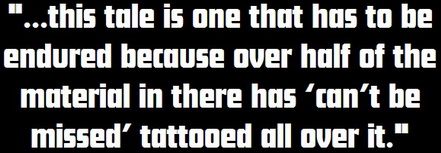|
| |
|
STORY PLACEMENT THIS STORY TAKES PLACE BETWEEN THE NOVELS "TOY SOLDIERS" AND "THE ALSO PEOPLE."
WRITTEN BY STEVE LYONS
RECOMMENDED PURCHASE OFFICIAL VIRGIN 'NEW ADVENTURE' PAPERBACK (ISBN 0-426-20454-9) RELEASED IN OCTOBER 1995.
BLURB Stand by for a new adventure with Dr Who and Jason!
Once again, our time- hopping friends set out to seek injustice, raise rebel armies, overthrow dictators and beat up LITTLE
green monsters.
faces a deadly new threat: a genocidal rogue Time Lord and his army of combat- hardened warrior women. AND To make matters worse, this foe is a SICk, twisted version of the good Doctor himself - and if Dr Who and Jason can't stop him, he'll end all life on Detrios
and ON Earth. their wits and with the modest power of control over reality, our heroes must face Dr Who's evil double: the megalomaniac scientist who calls himself simply 'The Doctor.' |
|
|
Head Games OCTOBER 1995
Head Games is a novel that doesn’t merely play upon the fact that it’s a sequel, but rather actively exploits it, almost to the level of parody. Steve Lyons’ first Doctor Who novel, Conundrum, was so good that I was almost lost for words when I was reviewing it. Regrettably though, Head Games is more Ghostbusters II than The Empire Strikes Back. A lot of it is first-class and some of it is absolutely spellbinding, however much of it is… well, boring.
Half the plot is rather fun. Jason – the new Master of the Land of Fiction – is loose in the real universe with all of his fictional powers in tact. He produces a character called ‘Dr Who’ who bears an uncanny resemblance to the late television series / early New Adventures Doctor – brown coat, question-mark pullover and all the customary accoutrements. Jason takes on the mantle of being companion to ‘Dr Who’ and together they set out on a mission to capture the evil ‘Doctor’ and all his companions…
As you can imagine, Lyons has a hell of a lot of fun playing around with this idea and lovingly poking fun at the show. The playful device also allows him to gather all the seventh Doctor’s companions together and use them to demonstrate just how much the Doctor (and indeed the series) has changed since Sylvester McCoy began his tenure.
Indeed, as the cover proudly (albeit unwisely) proclaims, Mel Bush is back. Now I’m sure that I’m not alone in my contempt for this character - her holier-than-thou attitude, her sickeningly cheesy ‘never say die’ spirit, her bloody awful scream… Suffice it to say that I was more than happy when she – apparently for no good reason – walked out of the TARDIS on Iceworld. Surprisingly though, in Head Games I actually enjoyed reading about Mel. There are some beautifully written passages where she reflects on exactly why she left the TARDIS… and the more she thinks about it, the less it makes sense. Eventually it comes to light that the Doctor willed her leave – not because he finally realised how annoying she was, but because he’d met Ace, seen Fenric’s hand in proceedings, and realised that he had business to attend to - business that Mel wouldn’t approve of. As the novel progresses and this eventually dawns on Mel, she begins to comprehend just how much the Doctor has changed since the days when she travelled with him. And she also begins to realise just how much she hates what he’s become.
BENNY I've come to think of him as invulnerable. Yet you saw him die – one of him at least. How did it happen?
MEL Well, he fell over and banged his head on the TARDIS console.
The ‘Sylvester McCoy in a blonde wig’ fiasco has become one of Doctor Who’s greatest embarrassments. In earlier novels, it was hinted that the sixth Doctor deliberately ended his life so that he could become the seventh Doctor – “Time’s Champion.” Head Games takes this idea a step further and postulates that the sixth Doctor was well on his way to becoming the evil Valeyard, and that this ‘suicide’ was not only brought about though a fervent desire to become Time’s Champion but, perhaps even more fundamentally, as a result of his fear of becoming the Valeyard.
What I particularly like about how Lyons has written this is that we don’t know for sure that the Doctor did deliberately terminate his sixth incarnation. Personally, I don’t think that the Doctor did run kamikazi into the Rani’s tractor beams. I think that during the regeneration – caused for whatever reason - there might have been a stray thought that the regeneration was for the best; that the “colourful jester” was dangerously close to the dark side and that Time’s Champion needed to step into the breach. And then as his own life has progressed, the seventh Doctor has seen so much blood on his hands that his old and remorseful mind is beginning to play tricks on him. By this stage, the seventh Doctor is so wracked by guilt that he feels that he wilfully ended his previous incarnation; that he cut his former self’s life short so that he could live. That he wilfully had Davros destroy Skaro. That he aided and abetted the destruction of the seven planets. That… I could go on. The long and short of it is that by the time of this novel his psyche is in such a state that, burdened by the weight of his past deeds, he feels an overwhelming duty to tie up the “loose ends” that his previous lives’ meddling have created. Time’s Champion is chopping and changing history so that it proceeds exactly as he thinks that it should have done originally. I suppose that this could mean that his present actions, in his seventh life, could undo some of the actions in his past lives - it would certainly explain away a few continuity blind-spots!
Head Games does wallow a lot in continuity. Aside from the obvious links to The Mind Robber and Conundrum, Lyons relies on many previous novels and almost every televised seventh Doctor story - even Glitz (The Trial of a Time Lord, Dragonfire) and UNIT’s own Brigadier Bambera (Battlefield) have cameos. Lyons also hammers home the link to Millennial Rites, this month’s Missing Adventure, a few times too many times for my liking, although I suppose it is relevant to the whole ‘Valeyard’ arc.
However, my real beef with this one is that about forty per cent of it is dreary beyond belief. Conundrum, for example, was littered with colourful characters but, only hours after finishing Head Games, I can’t name a single non-regular character other than ‘Dr Who’, Jason, and the alien bird that Chris falls for - Kat, I believe she was called. The whole ‘Enros’ sub plot was of no interest to me at all - I found myself reading Head Games almost purely for the banter between all the companions and the intriguing exploration of the seventh Doctor’s innermost thoughts.
On the one hand,
it’s hard to recommend a novel that contains so much fluff. But on the
other, when Head Games is good, it’s absolutely incredible. I’m afraid
that this tale is one that has to be endured
because over half of the material in there has ‘can’t be missed’ tattooed
all over it.
|
|
|
Copyright © E.G. Wolverson 2006
E.G. Wolverson has asserted his right under the Copyright, Designs and Patents Act, 1988 to be identified as the author of this work. |
|
|
Unless otherwise stated, all images on this site are copyrighted to the BBC and are used solely for promotional purposes. ‘Doctor Who’ is copyright © by the BBC. No copyright infringement is intended. |
|

.jpg)
.jpg)

 Whilst I’m on
the subject,
Whilst I’m on
the subject,